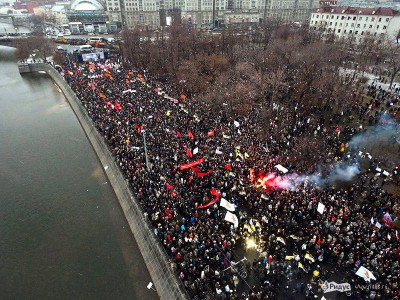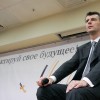Latest posts by Dmitry Davidov
Russia: Overview of Top RuNet Trends and Events in 2011
At the end of this turbulent and inspiring year, Global Voices RuNet Echo editors present you with the list of events that had a profound impact on the Russian Internet and will serve as important steps in the development of the country's online community.
Russia: Phone Hacking Case Unites Opposition
The leaking of private phone conversations of a prominent Russian opposition leader to the media has given rise to many issues and left a lot of questions unanswered. Dmitry Davidov reports.
Russia/Georgia: The Dilemma of Politics Blogging for Cash
One well-known Georgian political blogger writes of his dilemma in being approached for payment for a blog post. Blogging for cash is a recent shady public relations phenomenon in Russia and former Soviet Republic countries. Dmitry Davidov reports.
Russia: Controlled Media Support Party Hijacking
With Russia’s parliamentary and presidential elections quickly approaching, political battles are becoming an almost daily occurrence. The latest scandal has reminded many bloggers that political celebrities can be discredited as fast as they're pushed into the spotlight.
Russia: Why We Are Leaving Our Country Behind
Recent months have seen a new spin on the topic of emigration that seems to be ever-present in the Russian online space. Several powerful blog posts written by people from different social groups have become a platform for expressing one's take on the present and future of the country and people's place in it.
Russia: New Decrees Push for More Government Openness Online
On August 10, Russian President Dmitry Medvedev signed several decrees obliging 19 government agencies (including country's secret services) to put timely information online about their activities, Bloomberg reports.
Russia: Internet Audience Continues to Grow Rapidly
RuMetrika sums up the recent survey of “Public Opinion Foundation” on the Internet audience in Russia. According to it, the audience grew 7 percent (versus predicted 3.7) in the first...
Russia: Notorious Foundation Clashes with “Forbes”
Infamous “Federaciya” foundation accused “Forbes” employees of contacting the internationally famous guests of a Russian charity event and trying to persuade them not to attend, “Forbes” reported on its Facebook...
Russia: New Statistics of Social Network Users
Russian collaborative blog Habrahabr.ru publishes statistics on the users of Vkontakte.ru, the most popular social platform in Russia. According to the data, Alexander (for man) and Ekaterina (for women) are...
Russia: Photoblogger Covers Drug Addiction in Afghanistan
Popular Russian photoblogger Ilya Varlamov (zyalt) traveled to Afghanistan where (among other things) he covered drug addiction in Kabul.
Russia: Government Company to Bring Internet to Largest Island in Norway
Russian government company “Kosmicheskaya Svyaz” plans to bring fast Internet and digital TV to Spitsbergen, the largest island in Norway, news website Lenta.ru reported.
Russia: News Website to be Closed Because of Racial Clashes Coverage
URA.ru, an information agency and website that became popular after it extensively covered clashes in a small Russian village Sagra, is on the verge of being closed down by the...
Russia: Kremlin Critics Threatened With Travel Ban
On July 6, 2011, leading political opposition activists Boris Nemtsov and Vladimir Milov suddenly found themselves banned from leaving Russia by the country's Federal Bailiff Service. The concept of a travel ban has a special place in the hearts of people who lived during the Soviet Union.
Russia: Infamous ‘Vanishing’ Charity Foundation Resurfaces
The heartwarming performance of Russian Prime Minister Vladimir Putin playing the piano and singing the song "Blueberry Hill" at a charity concert, was darkened by the scandal surrounding the 'Federaciya' (Federation) foundation that allegedly tried to disappear with the money raised by the event. The charity has recently resurfaced, with plans for another concert underway.
Russia: New Initiative to Enforce TV Morality
An initiative to create a Public Oversight Board for media control in Russia may seem like a passage from Orwell’s Nineteen Eighty-Four but it is a reality in the country, which still struggles to accept the concept of democracy and free speech.
Russia: Reporters’ Open Letter Highlights TV Censorship Concerns
Censorship on the majority of Russian television channels has been around forever, but a recent open letter by REN TV reporters showed how even remaining small islands of media freedom could get washed away.
Russia: Bloggers React With Cynicism to Bin Laden's Death
The death of Osama Bin Laden in Abbottabad, Pakistan, on May 2, 2011, has provoked condemnation and talk of conspiracy theories among Russian bloggers. Quickly becoming one of the hottest topics of the Russian Internet, the death of Bin Laden did not divide netizens. In a rare instance of unity, Russian bloggers revealed their cynicism toward one of the most important events of this year.
Russia: ‘Online Superman’ Navalny Has Bloggers Divided
Alexey Navalny is much more than a blogger. He exploded onto the Russian Internet with scandalous revelations, often against political figures, and quickly grew into the country's "online Superman," fighting what seems to be an unwinnable war against corruption and an army of human bots. Not all bloggers are diehard fans though; many still deeply distrust Navalny.
Russia: Bloggers Debate Military Operation in Libya
The situation in Libya, especially after the start of military operations by Western countries, has become one of the main topics of discussion in the Russian blogosphere. Marina Litvinovich analyzes the reactions and trends surrounding the issue.
Russia: Online Media 2010-2011 According to Yandex.ru
New Yandex.ru report "Media sphere of RuNet. September 2010 - January 2011" suggests that Russian online media are growing but still have a long way to go to become a truly developed reporting platform.
Russia: Human Bots Fight Opposition
As Internet control becomes more and more sophisticated, new techniques join the arsenal of online deception and discreditation. Vadim Isakov analyzed the phenomena of 'human bots,' paid commenters willing to turn any constructive conversation into the mess.















